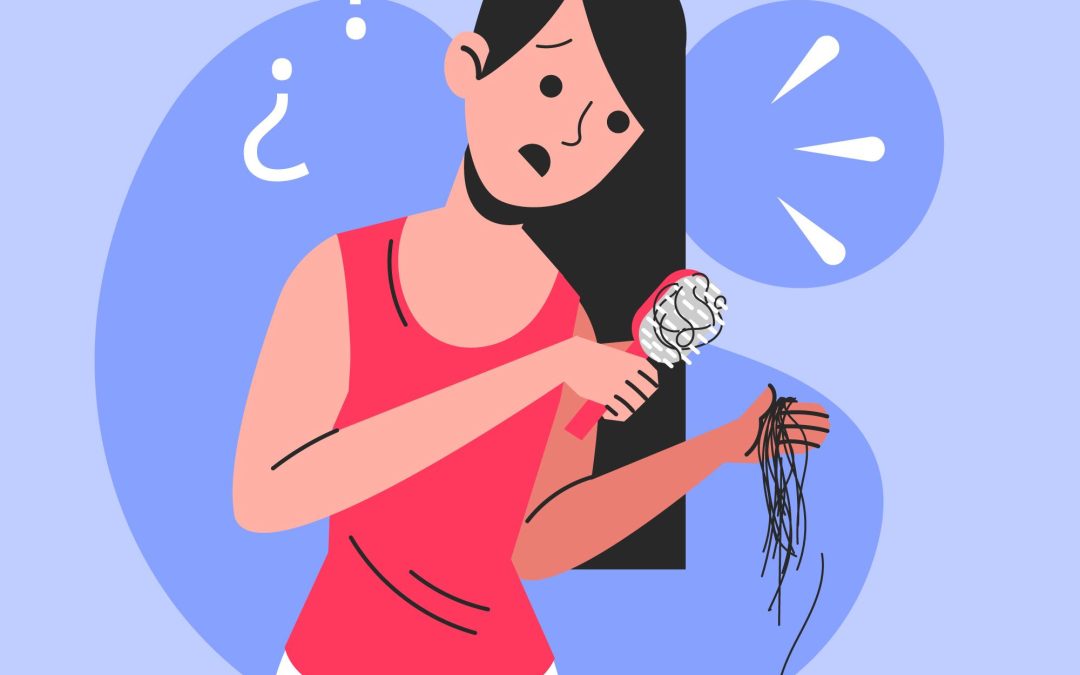Gut health plays a pivotal role in our overall wellness, but might it also influence hair loss? This article explores the intriguing correlation between an unhealthy gut and potential hair thinning or hair loss. Journey with us as we reveal the science behind how your gut affects your hair health, as well as the measures you can take to optimize both.
Gut issues and hair loss are two prevalent problems many people grapple with. However, less known is the link between digestion and hair loss. Given that your gut is tied to nearly every function in your body when your gut health is compromised, many other physiological functions may follow suit. So, if you suffer from poor gut health, you might be at risk of experiencing hair thinning and hair loss. The intricate relationships within your gut microbiome send signals to other parts of your body, including keratinocytes – the cells in your hair follicles – directing them to either attack and destroy a hair follicle or promote healthy hair growth from it. Therefore, the integrity of the gut microbiome is vital for optimal total body well-being.
A 2017 case study suggests a link between gut health and hair growth, although this connection is yet to be definitively proven. The study involved two patients with refractory alopecia universalis who suffered from recurrent Clostridium difficile infection (CDI). Alopecia is a clinical term for hair loss, and CDI is a harmful bacterium that causes dysbiosis when it becomes too prevalent. Both patients underwent a fecal-matter transplant (FMT) and experienced subsequent hair regrowth. This suggests that the gut microbiome’s composition may be associated with immune conditions and certain conditions that result in hair loss.
Potential Links Between the Gut and Hair Loss/Thinning Hair:
- An Unhealthy Gut May Lead to Stress – The gut-brain connection is vital. An unbalanced gut microbiome can send stress-inducing signals to your brain. When our bodies endure high levels of stress over extended periods, this can push our hair follicles into the resting stage of hair growth.
- An Unhealthy Gut Can Deprive the Scalp of Nutrients – Proper digestion and nutrient absorption require a healthy gut flora. Imbalances in gut bacteria, which are crucial for the production of certain elements like amino acids, triglycerides, and vitamins (B1, B9, B7, B2, B5, K), may disrupt the digestion and absorption processes. Consequently, despite consuming nutrient-rich foods, your body may not be able to extract the necessary molecules. This can lead to deficiencies in elements crucial for hair growth.
- An Unhealthy Gut Can Cause Scalp Inflammation – A diverse, healthy microbiome regulates peripheral immune responses in the gut, preventing system-wide inflammation. However, an imbalance or overgrowth leading to an increase in harmful bacteria elevates pro-inflammatory chemicals that can cause inflammation, including in the scalp. Research suggests a connection between inflammation and the arrest of hair growth, reinforcing the notion that controlling inflammation from the gut can reduce inflammation in the hair follicle itself.
How Can I Improve My Gut Health and Minimize Hair Loss?
Your diet serves as your first line of defense and is important for your hair health, too. You can prevent hair loss caused by nutritional deficiencies and improve your hair’s health by altering your diet to provide your body with the nutrients it needs to grow hair. Enhancing your hair health and reducing hair loss through dietary changes involves consuming a balanced diet rich in vitamins, minerals, proteins, healthy fats, and good bacteria – all crucial for a happy microbiome.
Probiotic supplements can be a useful way to introduce beneficial bacteria into your body. Studies in mice have indicated a possible link between the administration of probiotics and hair growth. A clinical study also demonstrated improved hair counts, hair thickness, and hair growth in patients with androgenic alopecia who consumed probiotic-rich fermented foods.
Final Thoughts
Your gut microbiome plays a crucial role in supporting a healthy immune system, thus preventing stress and inflammation that could result in hair loss. Additionally, it manufactures and synthesizes vitamins and micronutrients essential for hair growth. To maintain a healthy gut microbiome for hair health, you should nourish the beneficial bacteria with fermented foods, highly nutritious and fibrous vegetables, eggs, and healthy fats. Improving the absorption of some fat-soluble vitamins requires a dedicated effort over time. As with any significant dietary changes, it’s recommended that you consult your doctor or a certified nutritionist before embarking on this path.
Sources
[1] Rebello D, Wang E, Yen E, Lio PA, Kelly CR. (2017) Hair Growth in Two Alopecia Patients after Fecal Microbiota Transplant. ACG Case Rep J., 4:e107.
[2] Sadick NS, Callender VD, Kircik LH, Kogan S. (2017) New Insight Into the Pathophysiology of Hair Loss Trigger a Paradigm Shift in the Treatment Approach. J Drugs Dermatol. 16(11):s135-s140.
[3] Farris PK, Rogers N, McMichael A, Kogan S. (2017) A Novel Multi-Targeting Approach to Treating Hair Loss, Using Standardized Nutraceuticals. J Drugs Dermatol. 16(11):s141-s148.
[4] Levkovich T, Poutahidis T, Smillie C, Varian BJ, Ibrahim YM, Lakritz JR, et al. (2013) Probiotic Bacteria Induce a ‘Glow of Health’. PLoS ONE 8(1): e53867. https://doi.org/10.1371/journal.pone.0053867
[5] Park, D. W., Lee, H. S., Shim, M. S., Yum, K. J., & Seo, J. T. (2020). Do Kimchi and Cheonggukjang Probiotics as a Functional Food Improve Androgenetic Alopecia? A Clinical Pilot Study. The world journal of men’s health, 38(1), 95–102. https://doi.org/10.5534/wjmh.180119
https://tanyaleend.com/digestive-problems-hair-loss-how-ibs-ibd-can-cause-hair-thinning/
https://better-notyounger.com/blogs/the-better-blog/could-your-gut-be-behind-your-hair-loss
https://www.goodnessme-nutrition.com/gut-health/ibs-and-hair-loss/






